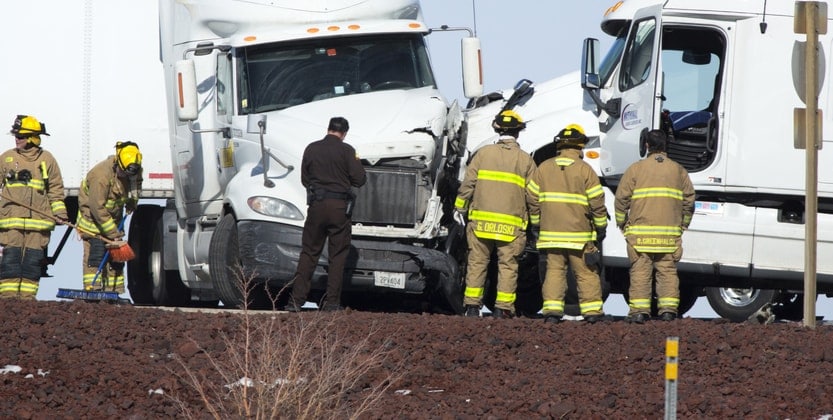Driving down Interstate-95, chances are you've spotted your fair share of semi-trucks. Weighing up to 80,000 pounds, these massive vehicles often take up their entire lane and then some, measuring several cars long.
As you carefully maneuver your way around them, you wonder if they can even see you - are you in their blind spot? How can they even tell what's going on around them in a vehicle that big?

Well, blind spots are just one of the common causes of a truck accident. Continue reading to discover the top eight causes of truck accidents.
If you've recently been injured in a truck crash, contact Weinstein Legal as soon as possible. After such an emotionally and physically traumatic event, you deserve attorneys who will fight for your rights. Contact a truck accident lawyer today for a free consultation.
1. Failure to Maintain the Truck
Semi-truck, 18-wheeler, or tractor trailer, whatever you call it, these massive vehicles require a bit more maintenance than your mom's Honda Civic. As with all vehicles, the brakes, tires, and valves all must be meticulously maintained in order to keep the truck running properly. However, trucks that are operating on five axles, such as an 18-wheeler, have many more moving parts than a typical car do.
For instance, semi engines are up to six times larger than car engines, in both size and weight. Compared to an average car, which only has four to five gears, a semi engine has over 12. Semi-trucks also feature up to five times the number of tires an average car would have, with double the tires on each axle for safety in case one tire blows.
While this may sound like added safety, these extra components on a truck often lead to accidents when they are not looked after properly. Faulty, damaged, or old parts are all leading factors in truck accidents.
2. Driving Over the Speed Limit
Driving over the speed limit is just one of the common traffic laws people break. However, when a semi-truck goes over the speed limit, the results can be deadly. In addition to limiting reaction time, speeding for a semi-truck is much different than for a passenger car. In general, trucks need 40% more time to fully stop than a passenger car.
When a truck is speeding, this stop time can increase by 50% to 60% longer. If something prompts the driver to stop, an accident can easily occur in that time frame.
3. Failure to Obey Traffic Signals
Failure to obey traffic signals is very problematic whether running a red light or neglecting to come to a complete stop at a stop sign. Massive vehicles, such as semi-trucks, breezing through traffic signals can be very dangerous to the smaller passenger cars they're sharing the road with.
Due to the limited reaction time and lengthened stopping time for a semi-truck, failing to obey traffic laws drastically increases the chances of an accident. Remember, traffic signals are put in place for a reason - we all have to obey by them.
4. Improper Passing
You know the aggravation you feel when the person in front of you brakes to make a right turn but doesn't signal for it? Or, even worse, when the person next to you decides to swerve into your lane with no indication? Now imagine a 40-ton vehicle veering around your 3,500-pound car. Sounds pretty dangerous, right?
Improper passing for semi-trucks causes plenty of accidents in the Florida area. Between switching lanes in the no-pass zone or failing to indicate their passing, improper passing is just one of the reasons why 18-wheelers are dangerous.
5. Larger Blind Spot
The average length of an 18-wheeler varies depending on the type of cab they're driving, but typically they measure between 70 and 80 feet long. Add this to the fact that they're near 14 feet tall, it's really not all that surprising that semi-trucks have a much larger blind spot than normal passenger cars.
While it is the obligation of the truck driver to ensure he or she has a proper assessment of their surroundings, this factor also applies to passenger vehicles sharing the road. Never attempt to drive immediately behind a truck, leaving no space between your vehicle and the tail-end of the truck. If you can't see around the truck, they definitely can't see you either.
6. Operating without Sufficient Sleep
Humongous vehicles such as semi-trucks require the driver to be fully alert while operating the vehicle. However, oftentimes the driver of a semi-truck is hauling cargo across the state and is operating on a schedule. For this reason, they often don't rest for as long as they need to, or even at all.
Operating without sufficient sleep limits the driver's reaction time and can impair his sense of judgment. Drivers can even fall asleep at the wheel when operating without proper sleep. When this happens, the result could be disastrous.
7. Inexperienced Drivers
Truck drivers share the same responsibility on the road as other drivers. This means that they should have the proper certifications to operate their vehicle, and should have adequate experience on the road. Unfortunately, that's not always the case.
Inexperienced drivers may not understand how to properly handle the vehicle, or underestimate the power of the vehicle. When it comes to trucking accidents, inexperienced drivers hold a fair share of the fault.
8. Carrying Faulty Cargo
For a tractor-trailer, cargo could be faulty for one of two reasons:
- The cargo is heavier than legal parameters.
- The cargo was loaded improperly.
The maximum weight allowed on federally funded highways is 80,000 pounds. When trucks are carrying more than the maximum weight limit it puts them at higher risk for an accident. Likewise, if the cargo was loaded improperly prior to leaving their initial location, movement during travel could result in an accident or injury on the road.


